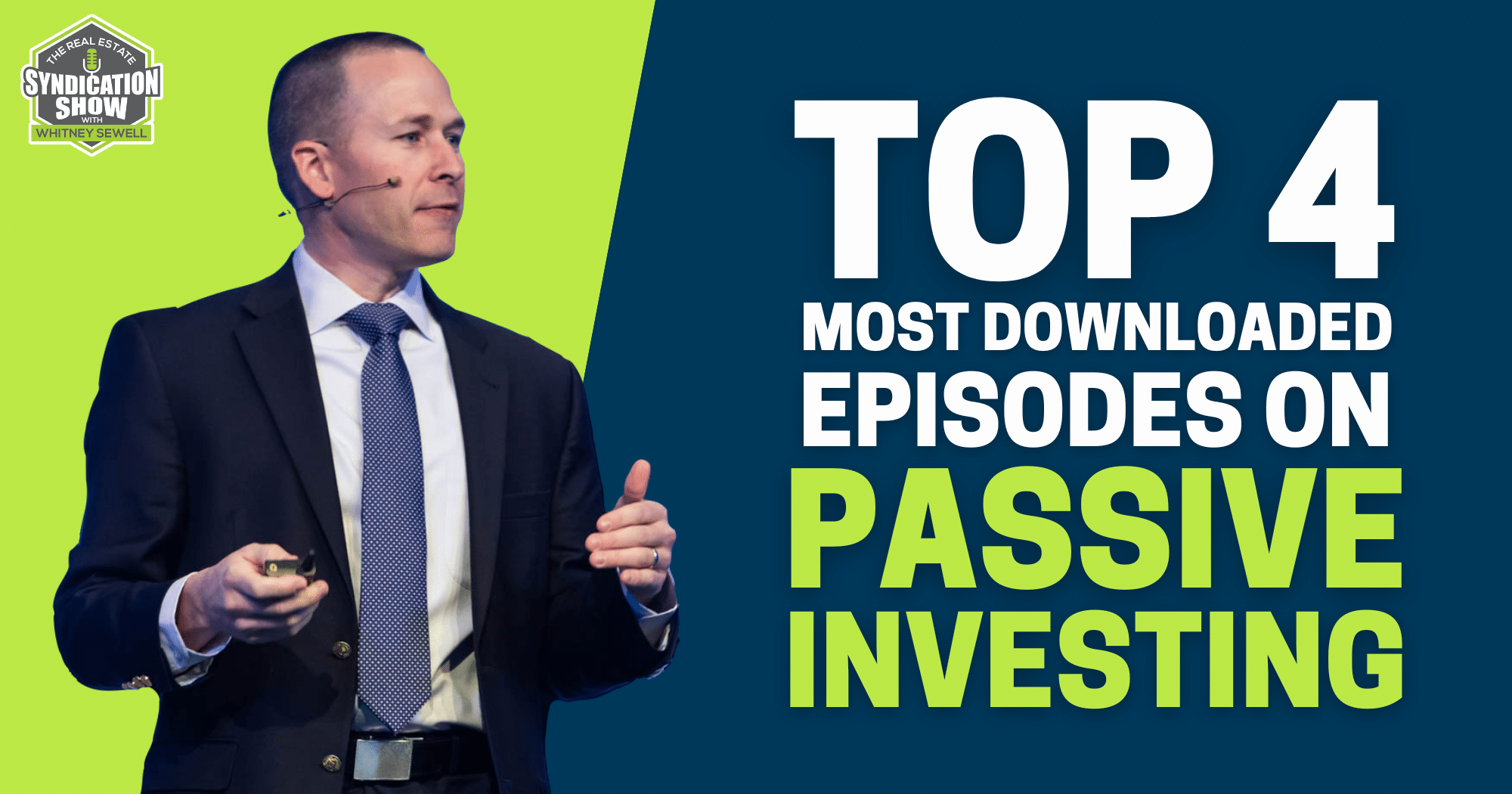
In this episode, we look back at our conversations with Maurice Philogene, Heather Dreves, Trevor Thompson and Denise Piazza. Our discussion zeroes in on how these pros have found their way into passive investing. Maurice talks about his journey to CRE, while Heather shares how her company helps finance investors achieve their passive income dreams.
Watch the episode here:
Listen to the podcast here:
Trevor, on the other hand, shares how he employs processes that make his investing more successful. Finally, Denise tells us how mentorship has helped her invest wisely.
Listen, learn and add these simple strategies to your passive investment plans!
Key Points From This Episode:
- What does Michael’s path to commercial real estate look like?
- Why did it take him 14 years to become financially independent?
- How does Heather make lending more inclusive?
- What are the processes that Trevor employs that would help passive investors?
- How has mentorship influenced Denise’s path to real estate?
Tweet This!
“What ended up happening is by the time I got to 2014 or 15, maybe a little bit earlier, I had a portfolio of almost 20 paid off places and then that essentially eclipsed my active salary with passive income and then you know, that’s kind of where the financial freedom started.” – Maurice Philogene
“Having a mentor is everything because they can guide you and even if the mentor is not 100% correct, it doesn’t matter.” – Maurice Philogene
“So, these small-dollar balances, that’s what this fund was really opened for, because we wanted to give that opportunity to invest and create wealth to everybody, just not high net worth individuals.” – Heather Dreves
“The most important thing is for you to spend time and find the right person that is the sponsor of the deal and connect with them.” – Trevor Thompson
“I also went with a mentor with not quite as large of a group, so I’ve been able to make some incredible connections with folks in that team and try to lead with my value-add to wherever they are in their process and wherever their experience takes them.” – Denise Piazza
Links Mentioned in Today’s Episode:
Maurice Philogene on Instagram
Maurice Philogene on LinkedIn
Secured Investment Corp website
Heather Dreves on LinkedIn
Trevor Thompson on LinkedIn
Trevor Thompson on Facebook
Main Line Capital Advisors website
WS455: Passive Income: Your Ticket to Freedom with Maurice Philogene
WS1179: Investing Actively or Passively through Trust Deeds with Heather Dreves
WS1157: How I Got into Passive Investing with Trevor Thompson
WS1062: From Passive to Active to Raising Capital for Your First Deal with Denise Piazza
About Maurice Philogene
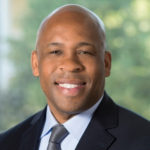
Maurice Philogene is passionate about living life to the fullest and invests in multi-family real estate as a way to make that possible. Maurice was born in New York, grew up in Boston, went to the University of Virginia and then ended up moving to Maryland. Additionally to being in real estate, Maurice has been in the military for 22 years and has been a street cop for 12. He is also in the consulting space with the federal government and works as a life coach too. As far as real estate goes, Maurice locates, invests and operates apartments, mobile home parks, and multi-family commercial real estate across the United States. He’s focused on conscious capitalism, providing safe and affordable housing for fixed income, veteran, elderly, and other communities in need.
About Heather Dreeves
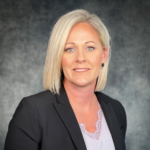
Heather Dreves is the Director of Funding at Secured Investment Corp and a fund manager that oversees the management of the Secured Investment High Yield Fund II LLC and the Circle of Wealth Fund III LLC, Secured Investment Corp is one of the fastest-growing real estate lenders and fund managers in the US. Secured Investment Corp has created two private equity funds to fill the void left by uncooperative traditional funding sources. Investors have the potential to earn double-digit returns based on past performance. By connecting real estate investors who needed non-traditional funding with passive investors who were ready to earn higher returns on their investments, Secured Investment Corp created an opportunity to benefit both sides. Passive investors get higher returns and real estate investors get quick, competitive loans to purchase and rehab those properties that traditional lenders will not touch. Heather enjoys lending money to self-employed entrepreneurs and their families. Watching people succeed in their business motivates her, and that’s why she and her lending team focus on transparency, mentorship, and making sure their people make their money back. She learned early on that focusing on the bottom line was not enough to sustain a business, and after foreclosures and property taxes caught up with many of her clients, she decided to change her approach. Now, seminars, classes, and success and accountability programs are all ways Heather and Secured Investment Corp are ensuring that their clients earn all their money back (and then some).
About Trevor Thompson
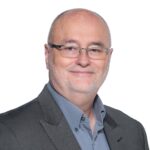
Trevor is a successful Vice President with 47+ years in the attractions and entertainment industry. He is highly observant, detail-oriented, and has a highly developed work ethic, values, history, and culture. He strives to maintain a harmonious environment offering service to others. Trevor communicates in group and one-on-one settings and is comfortable developing businesses, leading teams, and providing high-level results. He takes these skills into his new passion – Real Estate Investing. Over the past few years, he has become deeply passionate about learning about Real Estate Investing. He is an avid learner and is continually connecting with as many like-minded people as he can.
About Denise Piazza
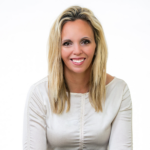 Denise Piazza is the founding partner of Main Line Capital Advisors. She began working within the real estate industry in 2004 through several tax and accounting engagements with real estate clients while employed at a CPA firm. She graduated summa cum laude with a degree in Accounting, a minor in Management Information Systems, and is a certified public accountant (CPA). She has 20 years of accounting, finance, and risk management experience and has managed teams of 30+ employees. Denise has held several finance and accounting roles with top Fortune 100 companies on teams managing over $1B in acquisitions, joint ventures and disposition of assets. Denise has also served on the Women’s Leadership and Risk Management committees of Fortune 100 companies. Her experience in finance and accounting has made her highly skilled in analyzing data and developing financial models. Denise has been investing in real estate for close to ten years in a variety of asset classes as both an active and passive investor. Her experience with multiple asset classes has led to her passion for investing in multifamily assets and educating professionals on the benefits of diversifying their portfolios with assets that provide strong, predictable returns. She is now a limited partner in close to 1,200 units of multifamily assets, and within three months of becoming an active investor, she has become a general partner on 400+ units. Denise and her partner also run a monthly real estate investing meetup group in Wayne, PA.
Denise Piazza is the founding partner of Main Line Capital Advisors. She began working within the real estate industry in 2004 through several tax and accounting engagements with real estate clients while employed at a CPA firm. She graduated summa cum laude with a degree in Accounting, a minor in Management Information Systems, and is a certified public accountant (CPA). She has 20 years of accounting, finance, and risk management experience and has managed teams of 30+ employees. Denise has held several finance and accounting roles with top Fortune 100 companies on teams managing over $1B in acquisitions, joint ventures and disposition of assets. Denise has also served on the Women’s Leadership and Risk Management committees of Fortune 100 companies. Her experience in finance and accounting has made her highly skilled in analyzing data and developing financial models. Denise has been investing in real estate for close to ten years in a variety of asset classes as both an active and passive investor. Her experience with multiple asset classes has led to her passion for investing in multifamily assets and educating professionals on the benefits of diversifying their portfolios with assets that provide strong, predictable returns. She is now a limited partner in close to 1,200 units of multifamily assets, and within three months of becoming an active investor, she has become a general partner on 400+ units. Denise and her partner also run a monthly real estate investing meetup group in Wayne, PA.
Full Transcript
EPISODE WS1633
[INTRODUCTION]
Whitney Sewell (WS): This is your Daily Real Estate Syndication Show. I’m your host, Whitney Sewell. Today, I hope you enjoy some of our most downloaded episodes on passive investing.
[INTERVIEW 1]
WS: Our guest is Maurice Philogene. Tell me about your path, though, to financial freedom. And let’s go to kind of your growth through this real estate business a little bit.
Maurice Philogene (MP): Yeah, it’s been – now that I look back on it, it’s been a beautiful path. When all that happened, I was 23 like I told you. I think right after 9/11, I deployed for my first deployment, left for a year and a half, almost two years. Came back but I kept up the real estate stuff as I was going the entire time. What I just told you about the single family, I just pressed repeat. I literally, I bought those 10 places, rented them out, self-managed which was crazy but I kept buying and buying, and what ended up happening, I got somewhere upwards of 30, 35 single family homes.
At the time, I didn’t know about commercial and we can talk about that later but I got to about 35 single family homes as far south as Fredericksburg Virginia, as far north as the Maryland Delaware line. Self-managed them all but I got fortunate in the fact that there was that boom cycle going. A lot of them increased on the equity side. I give myself a little bit of credit because I got smart and sold some of them off and what I did was take the equity from the ones that made fair amount of equity, increased the value and I then took my salary for my full time employment, combined them with rents and then I started paying of each property one by one.
What ended up happening is by the time I got to 2014 or 15, maybe a little bit earlier, I had a portfolio of almost 20 paid off places and then that essentially eclipsed my active salary with passive income and then you know, that’s kind of where the financial freedom started.
I recognized I had more passive income coming in than I had active income.
WS: I know there’s listeners who can relate to wanting to transition from say single family to commercial real estate and you talked about finding that mentor and could you just elaborate like the importance of having that mentor and some guidance and would you recommend that to everybody else?
MP: Yes. The reason it took me 14 years to become financially independent on the single family side is because I did it myself. The reason it has taken me three years to execute on 10 plus, 50 to 150 unit buildings in the multi-family space is because I had a mentor. Because that mentor showed me what to do, what not to do, and more so than the day to day semantics of actual transactions, that mentor helped me break down limiting beliefs from the beginning.
When I started with him – his name is Craig. I won’t put his last name out there but when I started with him, he recognized something in me and he said, “Hey man,” – he lives in Rhode Island. He said, “Hey man, I’m going to fly down to DC and I’m going to come spend a couple of days with you.” I was like, “Cool,” so I cleared out the calendar. We spent 16 hours together, two days straight together and it had nothing to do with how to execute a real estate transaction.
It had everything to do with why, I guess, mentally, I didn’t think that I should be doing big real estate deals, mobile home parks, why I didn’t think I could go out and get an eight-million-dollar loan, that was actually secured by a building and not even secured by me as an individual. Having a mentor is everything because they can guide you and even if the mentor is not 100% correct, it doesn’t matter.
That person, he or she is going to push you forward one way or the other, and then as you grow as a person, that particular mentor – I’m not working with him now, because I had now grown into a different investor and more importantly a different person, right? I’m working with somebody else who is more in line with my life values at the moment.
But what I have accomplished in the past three or four years, there’s no way I would have been able to accomplish that had I not had a mentor on my team.
[INTERVIEW 2]
Sam Rust (SR): Heather has been in the private money industry, helping clients passively invest in alternative assets through high-yielding real estate funds and trust deed investing. Could you enlighten us a little bit as to the exact structure that you guys are using and how you go to market with lower minimums and no need to verify accreditation status?
Heather Dreves (HD): So, they change the securities laws a few years back, and they open up the opportunity to open up what’s called a Regulation A-plus fund. And really all that means is you can have non-accredited investors enter the fund. And the only rules that the SEC makes is they can only invest up to a maximum of either 10% of their total assets or 10% of their income, and that’s how the SEC regulates it and make sure, really what the SEC’s out there to do regardless of what we all think, they’re not there to just make our lives difficult.
They are there to protect the investors, and I think that’s really important. And so, they say, great, you can let non-accredited investors into this fund, but the maximum that they can invest is that 10% threshold, that way somebody’s not putting all their eggs in one basket, right? We were one of the very early adopters of Reg-A fund back a few years, especially a Real Estate Fund, there are not many of them out there. Usually, they’re technology crowdfunding types of opportunities, but we have a huge challenge because we have this accredited investor fund, which was great, and we have a ton of accredited investors, and then we had trust deeds.
Well, our minimum trust deed is $30,000. If someone wasn’t accredited, they had to have at least 30,000, and not everybody does, and we work with a ton of clients that use self-directed IRAs, or they have an old 401 from five employers ago that they never moved. And we’re thinking to ourselves, what a great opportunity for small dollar balance IRAs, 401(k)s, I had a guy today, he bought a trust deed from me, he called me this morning and said, I’ve got five grand just sitting here, can I just put that in your fund?
So, these small-dollar balances, that’s what this fund was really opened for, because we wanted to give that opportunity to invest and create wealth to everybody, just not high net worth individuals. And so, we opened up what we call the Circle of Wealth Fund III, it has a minimum of $1000, and like I said, you can go up to 10% of your assets or 10% of your estimated income in $1000 increments. It’s got a tie-up period of a year, so they have to stay invested for 12 months.
And the really neat thing about both of our funds is they can actually reinvest their earnings, so they’re really just compounding it, and that fund pays out monthly, so it’s been targeted and hitting 8-10%, but when you’re compounding your earnings, it probably is an additional half a percent, because you’re just rolling those earnings right back into your equity and growing that every month.
[INTERVIEW 3]
WS: Our guest is Trevor Thompson. Trevor’s a passive investor and limited partner, in over 14 syndicated deals. He has a unique background developing different types of businesses with over 45 years of developing unique attractions focused on creating exceptional experiences. So, can you share some of the, just the processes that would help that passive investor that’s listening right now.
Trevor Thompson (TT): The most important thing is for you to spend time and find the right person that is the sponsor of the deal and connect with them. The more I’ve done it, the more I realized that the lead sponsorship team – when I look at investing now – that is my first criteria. Who is the investment team? Who are the leads? What have they done? How have they connected with me? Do I possibly have a future to either invest with them more or get to the next level to where they would bring me on one of their deals when I fill the role? And so, to that end, I’ve done a lot of volunteering as some like to call it.
So, one of my projects that I invested very early on, they were really struggling, and I had some time. Covid had furloughed me, and so I had some time, so I volunteered as an asset manager. And what happened was, they had an asset manager across their portfolio, so I thought, okay, I’m going to learn from him, or they dismissed him a few days into my tenure of doing that, and then three weeks later, they fired the property management company.
So, here I found myself a first-time asset manager, really in a volunteer role, running a deep value-add 176-door apartment complex two hours from where I live. But what looked very painful, was also super educational. I was basically thrown into the deep end and I learned a ton. And then of course, everything got more complicated when you had a pandemic role in, and so I would not give out that experience for anything to be able to learn what I learned during those 10 months that I was a volunteer. And that really set me up for my new direction and where I’m going.
And I’ll be honest, I learned a lot of what to do, and I learned a lot of what not to do. And that really cemented my view on really understanding who you’re investing with. Near the end, we had some differences and then that ended my tenure as the asset manager. Fortunately, now that property has gone full cycle. Unfortunately, we didn’t make any money, and I think if I just stayed and been able to keep implementing, then there was a very good chance we could have. But who knows, right?
[INTERVIEW 4]
WS: Our guest is Denise Piazza. She is a founding partner of Main Line Capital Advisors. She’s been investing in real estate for close to 10 years in a variety of real estate asset classes as both active and passive investing, so her experience with multiple asset classes led to her passion for investing in multi-family and educating professionals on the benefits of diversifying their portfolio with assets that provide strong predictable returns. Is there any way that anything that’s helped you accelerate that transition from passive to active… Anything that’s helped.
Denise Piazza (DP): Sure, first of all, I’d say just my passive investing experience across multiple different asset classes and taking the time to develop my passion for multifamily, so I’ve now invested in close to 1200 doors as a limited partner, I use those experience to figure it out what I liked and what I didn’t like about working with different operators, I also use the experience to learn best habits in terms of communications with investors and experience in different markets and diversifying myself, as I said, I had that experience with financial models through my corporate roles, but in understanding the nuances to multi-family assets, I really made that one of my main goals in deciding to make that transition, and I think that really helped accelerate that transition, another step that I took, as I mentioned as well, is really finding the right mentor, one that if at all possible, you can find that has complementary skill sets to yours, and that’s their greatest strength and greatest attribute that they can bring to your background.
And then I also went with a mentor with not quite as large of a group, so I’ve been able to make some incredible connections with folks in that team and try to lead with my value-add to wherever they are in their process and wherever their experience takes them, I know can do what I can do to help contribute to their success as well, and then truthfully, I would say the main thing that has contributed to accelerating my role as a co-GP would be my discipline and my sacrifice, so being an active operator for multifamily deals, as you know, is a lot of work, you have to be extremely disciplined in your approach and effectively using your time, so I like to think this is an area that I excel in just because of the example that my parents had set for me growing up in qualities that they instilled in me, and then the last, the fourth piece I would say is really just network.
Network until you’re so exhausted that you can’t network anymore. It’s so critical because it opens up so many doors through networking with other individuals, I host a monthly real estate investing meet-up, I attend conferences, I am constantly reaching out to other syndicators, and as you know, there’s so many folks in this space that are incredibly generous with wanting to share their experiences, so it really provides a great opportunity for you to learn from other people’s experiences.
[END OF INTERVIEW]
[OUTRO]
WS: Thank you for being with us again today. I hope that you have learned a lot from the show. Don’t forget to like and subscribe. I hope you’re telling your friends about the Real Estate Syndication Show and how they can also build wealth in real estate. You can also go to LifeBridgeCapital.com and start investing today.
[END
Love the show? Subscribe, rate, review, and share!
Join the Real Estate Syndication Show Community:




